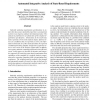Free Online Productivity Tools
i2Speak
i2Symbol
i2OCR
iTex2Img
iWeb2Print
iWeb2Shot
i2Type
iPdf2Split
iPdf2Merge
i2Bopomofo
i2Arabic
i2Style
i2Image
i2PDF
iLatex2Rtf
Sci2ools
109
click to vote
KBSE
1998
IEEE
1998
IEEE
Automated Integrative Analysis of State-based Requirements
Statically analyzing requirements specifications to assure that they possess desirable properties is an important activity in any rigorous software development project. The analysis is performed on an abstraction of the original rets specification. Abstractions in the model may lead to spurious errors in the analysis output. Spurious errors are conditions that are reported as errors, but inforbstracted out of the model precludes the reported conditions from being satisfied. A high ratio of spurious errors to true errors in the analysis output makes it difficult, error-prone, and time consuming to find and correct the true errors. In this paper we describe an iterative and integrative approach for analyzing state-based requirements that capitalizes on the strengths of a symbolic analysis component and a reasoning component while circumventing their weaknesses. The resulting analysis method is fast enough and automated enough to be used on a day-to-day basis by practicing engineers, and...
Related Content
| Added | 05 Aug 2010 |
| Updated | 05 Aug 2010 |
| Type | Conference |
| Year | 1998 |
| Where | KBSE |
| Authors | Barbara J. Czerny, Mats Per Erik Heimdahl |
Comments (0)

